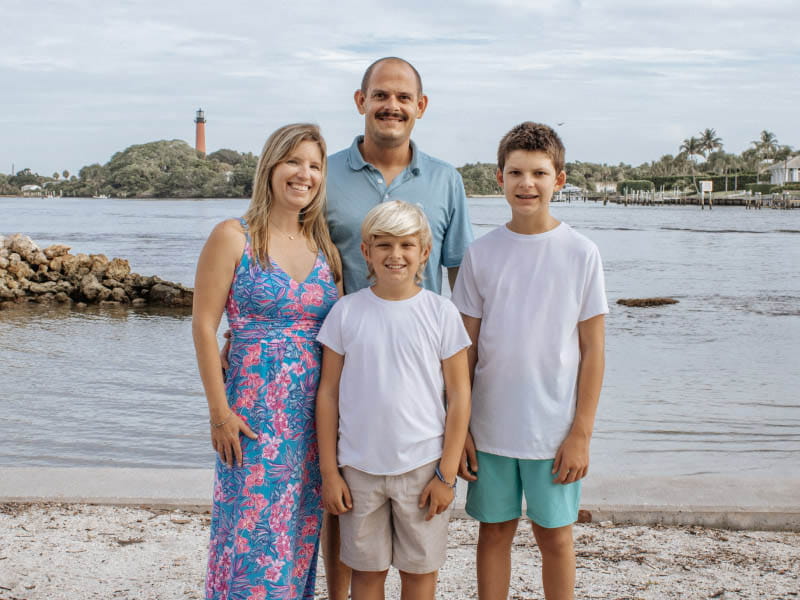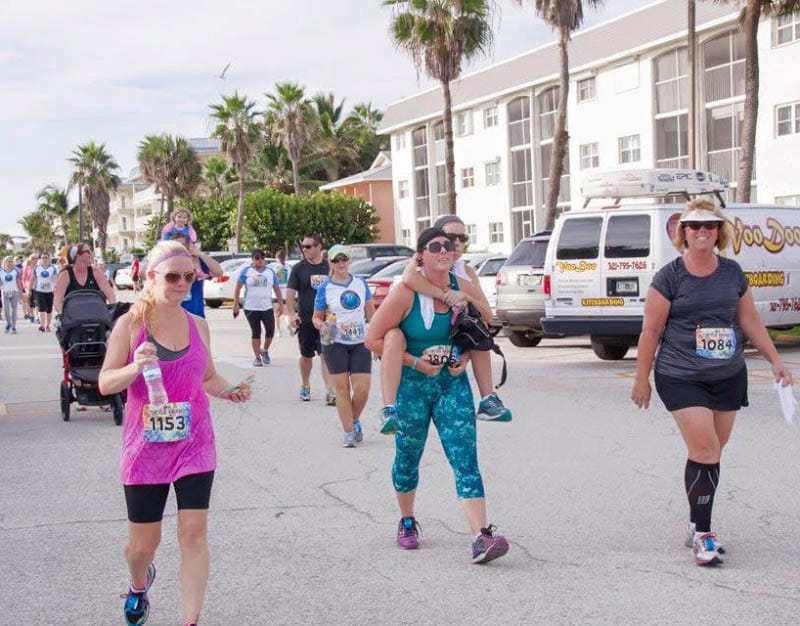She had a stroke while training for a half-marathon. Then came breast cancer. Now she's trying again.
By Diane Daniel, American Heart Association News

To prepare for her first half-marathon, Kandi Schmitz signed up for a 5K run. Six friends and family members decided to join her.
The race was in Melbourne, Florida, a two-hour drive from Schmitz's home in Loxahatchee, near West Palm Beach. So she decided to make a beach getaway out of it. By the time hotel reservations were made, the entourage had swelled to more than 20, including Schmitz's husband, Matthew, and their two young sons.
On race day in 2015, Kandi, then 31, and her fellow runners woke up early and left their families back in the hotel.
The first 45 minutes of the run went smoothly. With the finish line in sight, she felt a sharp pain in her left shoulder, like a pinched nerve.
Suddenly she felt lightheaded and feared she would pass out. She sat down on the sidewalk and put her head between her knees. With the ocean breeze on her face, she felt a little better. But she didn't feel stable enough to make it over the finish line.
Her friend Kayla Cabrera, who'd already finished, noticed Kandi on the ground and went to help.
"I can't make it," Kandi said.
"Get on my back," Cabrera said. "You're crossing that line."
She hoisted Kandi and piggybacked her for about two minutes to the cusp of the finish line. Kandi was able to walk across it.

After a few minutes of rest and hydration, Kandi felt well enough to walk to the car. Then she felt a migraine coming on. She had them occasionally, though this one affected her vision more. They always went away, so she wasn't worried.
The whole gang met for breakfast. Standing in line, Kandi got dizzy again. She rested on a bench.
"Hey, sit up and eat something," Matthew said, as he arrived with food.
"I am sitting up," she said.
Matthew, a paramedic, thought that was weird. But he and other family members, including a nurse and a fire chief, assumed Kandi was dehydrated.
He handed her a cup of water with rehydration salts in it. She drank some but then got sick to her stomach.
"Do you want to go back to the room, or to the hospital?" Matthew asked.
"I just want to feel better," Kandi answered.
He noted that one of her pupils was dilated.
"We're going to the hospital," he said.
Matthew expected Kandi would get an IV with fluids and then they'd head to the beach.
Instead, once she was in the hospital, her speech slurred slightly. She broke out in a sweat and started vomiting.
Doctors ordered several tests, including a CT scan.
As Matthew was standing in the hallway outside of Kandi's exam room, a neurologist approached him.
"Your wife has had a stroke," the doctor said. "There's a clot in the vessels that supply blood to her brain."
The cause was a vertebral artery dissection, a microscopic tear in an artery in her neck. A blood clot had formed there, blocking blood flow to her brain.
Because Kandi was diagnosed within four hours of the onset of symptoms, she received clot-busting medicine. That evening, she was medically transported to a stroke center in West Palm Beach so she could be closer to home.
In the morning, Kandi's dizziness was gone. But the clot wasn't. Doctors told her it would slowly dissolve over the course of a few months.
They found no other issues and could not detect a reason for the tear. She was sent home with instructions to do no heavy lifting for a month.
After three months, the clot indeed had vanished.
Still, Kandi was convinced she would have another stroke.
Over the next two years, she'd panic every time she had a headache and request an MRI. It was always clear.
Before the stroke, Kandi had been active and independent. Now, she didn't want to leave the house. She also was afraid to exercise.
"I just wanted to be a hermit crab at home," she said. "It was my safe place."
She saw a therapist, which helped. Matthew coaxed her into driving again. In May 2016, she started working again as an insurance agent, which she'd done before having her second son.
In 2021, she joined girlfriends on a getaway to Nashville. It was her first time away from the family since the stroke. Instead of enjoying their outings, she felt anxious and wanted to stay in.
"Being away from home, without my crutch – my husband and family – I felt anxiety times 10," she said.
When she got home, she started seeing a therapist again. She also started taking medication for anxiety. Both helped tremendously.
The next year, she started walking and jogging again. She even ran a 10K.
By 2024, Kandi's only lingering issue from her stroke involved her depth perception when rounding corners. She decided to celebrate her 10-year "strokeaversary" the following year by again going for a half-marathon.
Then came another setback.
Last October, a routine mammogram detected a spot in her right breast. It turned out to be invasive ductal carcinoma, the most common type of breast cancer. It begins in the milk ducts and then spreads into nearby breast tissue.
After multiple tests, medical appointments and biopsies, Kandi had a lumpectomy, followed by radiation and hormone therapy. Her final radiation treatment was in mid-April.
This spring, she started walking and lightly exercising again. She plans to start running over the summer. The half-marathon is in October.
"I don't want to look back and regret not doing things," Kandi said. "I could have been wiped out twice now, and it didn't happen."
Stories From the Heart chronicles the inspiring journeys of heart disease and stroke survivors, caregivers and advocates.





